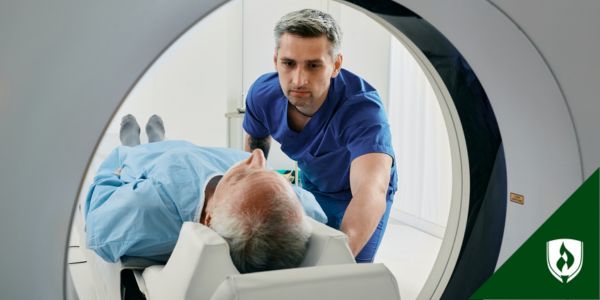
If you’re interested in working in healthcare, but don’t want to commit to a degree, you have options!
There are many opportunities to land medical jobs without a degree, and many of these positions are seeing employment growth projected at faster-than-average rates, according to the Bureau of Labor Statistics.
We identified seven healthcare career paths that you can get started on without earning an associate’s or bachelor’s degree. Keep reading to get acquainted with these in-demand opportunities that to start making a meaningful difference in healthcare while earning a paycheck. If you're curious about what you can do with a healthcare associate's degree, read more here.
7 Rewarding healthcare jobs you can launch without a degree
Healthcare jobs are different than any other industry. In this way, the world of healthcare is friendly to career changers as well as to professionals who need to get started in a new job, earn a paycheck and get a feeling for the role before they invest in extra education.
If you have a high school diploma (or equivalent), here are some healthcare careers you should consider.
1. Medical administrative assistant
If you've ever visited a clinic or hospital, a medical assistant is most likely the first person you saw. These medical professionals greet patients, assist healthcare providers and generally oversee the process of getting patients scheduled, checked in and ready for their care.
Medical assistants (MAs) work in a variety of medical settings to perform basic administrative tasks. Their daily duties include answering the phone, collecting patient information, scheduling appointments and greeting patients when they arrive in the waiting room.
If you’re an organized person who can handle a variety of tasks and with customer service skills, this is a great entry-level position for you.
As a note, if instead of the more office-centric role profiled here, you are looking for a hands-on position, assisting other healthcare providers with patients, just scroll down a bit.
Projected employment growth (2022–2032): 14 percent1
Education requirements: There are no formal requirements for this career beyond a high school diploma (or similar). If you have any experience with a customer service role, that would be a great thing to include on your application.
Medical assistants have a big impact on patient experience. Remember, sometimes you'll interact with people who could be facing a terrifying appointment, dealing with loss or (if you work in a hospital) facing sudden disaster. A patient and compassionate presence is crucial.
Employers may prefer candidates with some specialized training. At Rasmussen University, you can acquire a Medical Administrative Assistant Certificate in as few as nine months.2
2. Medical records specialists
Pretty much every major healthcare facility today uses electronic health records. Medical records specialists include medical billers and medical coders.
They review the notes that healthcare providers record and assign codes that correlate to the types of services, supplies and procedures that a patient was given. Accurate recording of specific codes and other information is correlated to the insurance reimbursement that healthcare facilities and providers receive—so accuracy is of the utmost importance.
Protecting confidential medical records, adhering to compliance regulations and deciphering medical terminology are all essential parts of the role. Medical records work is detail-oriented, as the codes and policies are constantly changing. If you have a keen eye for detail and like the idea of working behind the scenes, this career is a great starting point.
See What Is a Medical Coder? An Easy Explanation for more detail on this.
Projected employment growth (2022–2032): 8 percent1
Education requirements: Many employers require medical records specialists—particularly those involved in medical coding—to obtain certification. At Rasmussen University, you can complete a Medical Billing and Coding Certificate program in as few as nine months.2
This program will help prepare you to pursue the American Health Information Management Association (AHIMA®) Certified Coding Associate (CCA®) credential.
3. Phlebotomist
Phlebotomists draw blood from patients in clinics, hospitals, blood donation centers, transfusion sites and research facilities, according to the Bureau of Labor Statistics (BLS)1.
Their daily duties include verifying and updating patient information, collecting blood samples, organizing instruments and disposing of contaminated sharps and other biohazardous material. If you can handle the sight of blood, have a compassionate nature and a talent for precision, this role is a good fit.
Phlebotomy is also one of those clinical tasks that stays pretty specialized no matter where you work. This can be a good career option for people who want a hospital job.
Projected employment growth (2022-2032): 8 percent1
Education requirements: Most phlebotomist roles require only a high school diploma, and many can be trained on the job.
4. Pharmacy technician
A pharmacy technician works directly under the supervision of a pharmacist in performing a variety of tasks. Their responsibilities include helping to fill prescriptions, recording information, organizing inventory, accepting payment, processing insurance and more. If you’re eager to take the fast track to a hands-on career, this could be a great way to kick things off.
For a closer inside look, see 5 Key Pharmacy Technician Duties You Can Expect on the Job.
Projected employment growth (2022–2032): 6 percent1
Education requirements: Many states require that pharmacy technicians complete a certification program. These short programs can be very worthwhile, for more reasons than just looking good on a resume—5 Reasons a Pharmacy Technician Certification is Worth It.
5. Clinical medical assistant
Clinical medical assistants work on the clinical side to support physicians and nurse practitioners.
They might take a patient’s vital signs, help a provider with examinations, administer injections or prepare a blood sample for lab work. If you want hands-on clinical experience without spending years earning a college degree, this is the position for you. This is also a great entry-level healthcare career if you’re hoping to gain some clinical experience to leverage in the future.
Projected employment growth (2022–2032): 15 percent1
Education requirements: It is important to understand the education, licensing, and certification requirements for the state you wish to work in as a medical assistant. For more detail on certification options, check out RMA (ARMA) vs. RMA vs. CMA: Making Sense of Your Medical Assisting Options.
To get some of the formal training an employer might prefer, earning a Medical Assisting Diploma is a great option. A medical assisting diploma program can be completed in as few as 12 months.2
6. Certified nursing assistant (CNA)
Nursing assistants provide basic daily care for patients. Common tasks include assisting patients with eating, bathing and dressing as well as taking vital signs and reporting new information to nursing staff.
This role can be similar to that of a patient care technician (or to that of a medical assistant who works directly with patients) depending on the state. Patient care technicians, MAs and certified nursing assistants are all in a category of unlicensed assistive personnel in healthcare.
Nursing assistant positions are most common in long-term care environments when patients need consistent help performing daily functions of living. But you can find these types of roles in many different health care settings.
Nursing assistants have a physical job that often involves moving patients, from bed to wheelchair for example, as well as transporting them to different spaces in the facility for meals or treatments. Nursing assistants also clean and restock supplies in their assigned areas.
Because they work with the same patients day after day, many nursing assistants establish close connections with the people they care for.
Projected employment growth (2022-2032): 4 percent1
Education requirements: Many nursing aide positions only require a high school diploma, with some employers looking for certified nursing assistants. To become a CNA, most states require you to have a high school diploma (or similar) and pass a screening. Then you can apply for certified nursing assistant (CAN) training. These typically take just a few weeks.
7. Licensed practical nurse (LPN)
Licensed practical nurses (LPNs) work under both registered nurses and physicians to provide nursing care. Their duties may include changing bandages, checking blood pressure and helping patients perform a variety of self-care tasks like bathing or dressing. The work will vary depending on the setting and state.
If you’re considering a career in nursing but aren’t ready to commit to a higher degree, becoming an LPN is the way to go.
Projected employment growth (2022–2032): 5 percent1
Education requirements: LPNs must be educated through a state board-approved program in order to be eligible to take the National Council Licensure Examination (NCLEX-PN®) through the National Council of State Boards of Nursing. It is important to check with the state board of nursing for the state you wish to be licensed in.
If you are interested in becoming an LPN, look for a Practical Nursing Diploma accredited by a national nursing accrediting agency that is recognized by the United States Department of Education. These programs typically take about a year to complete and combine classroom and supervised clinical experience.2
Get started on your healthcare career path
You may be pleasantly surprised at the number of health care jobs that don’t require a degree. With so many growing opportunities in the field, there are plenty of career paths to choose from. Have a weak stomach? Check out medical careers for weak stomachs.
If you begin with one of these healthcare jobs, you can decide if working in healthcare is really for you. Or, if you'd like some more options to brainstorm—there are loads of careers you could get into that offer more specified roles. And many of them don't require extensive education either.
Check out 16 Health Science Careers You Can Launch in Two Years or Less to learn about surgical technologists, physical therapist assistants and more!
Read the benefits of working a holiday in healthcare.
1Bureau of Labor Statistics, U.S. Department of Labor, Occupational Outlook Handbook, Medical Records Specialists, at https://www.bls.gov/ooh/healthcare/medical-records-and-health-information-technicians.htm (visited February 2024)
2Completion time is dependent on transfer credits accepted and courses completed each term.
EDITOR’S NOTE: This article was originally published in February 2016. It has since been updated to include information relevant to 2024.
AHIMA® is a registered trademark of American Health Information Management Association
CCA® is a registered trademark of American Health Information Management Association




